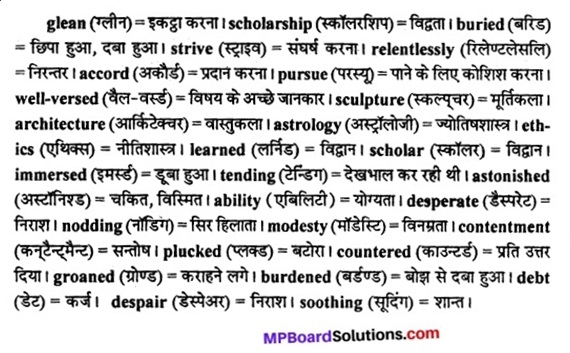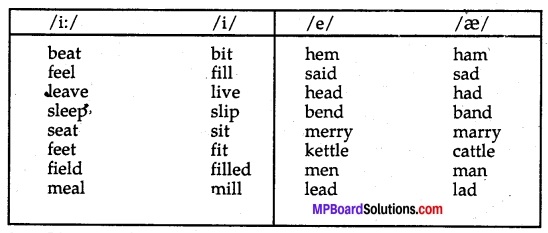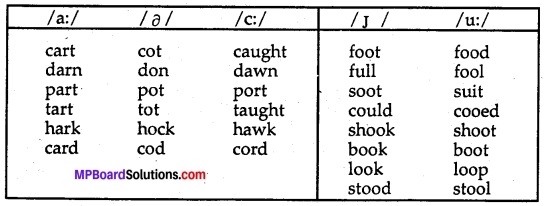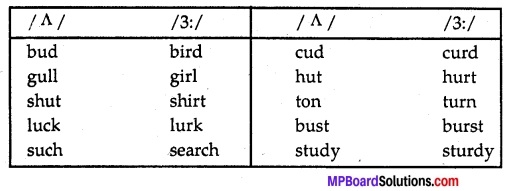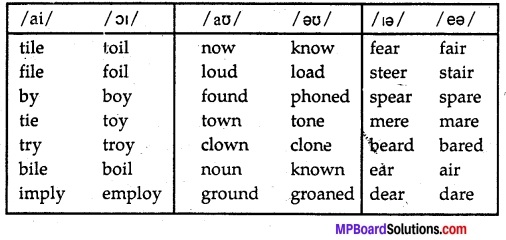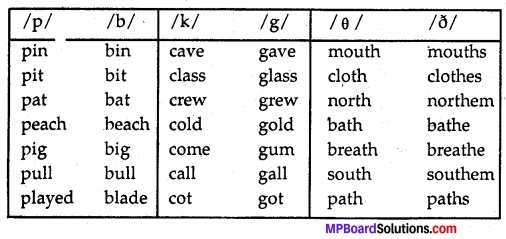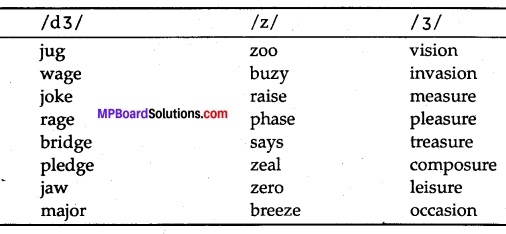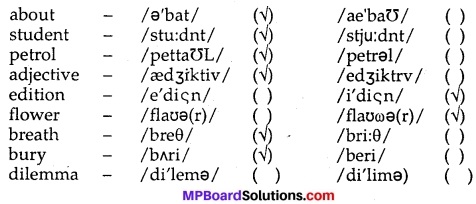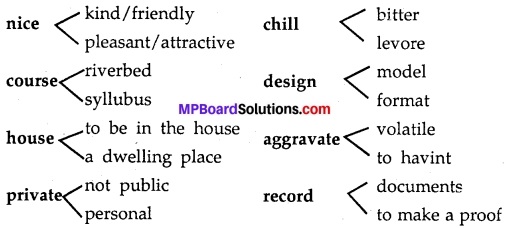Students who are studying 11th can get the free Madhya Pradesh Board Solutions for 11th English Chapter 3 Dear Teacher Questions and Answers PDF here. You can download MP Board Class 11th English Solutions Questions and Answers PDF on this page. Practice questions of Mp Board Solutions of 11th English subject as many times as possible to get good marks.
MP Board Class 11th English The Spectrum Solutions Chapter 3 Dear Teacher
Gather chapter wise MP Board Solutions for 11th English Study Material to score the highest marks in the final exam. Various chapters and subtopics are given clearly in MP Board Class 11th English Solutions Chapter 3 Dear Teacher Questions and Answers Material. All the MP Board Solutions for 11th English Questions with detailed answers are provided by subject experts. The step by step MP Board Class 11th English Chapter 3 Dear Teacher Questions and Answers guide will help you to enhance your skills in English subject and The Spectrum Solutions. Here, along with the subject knowledge, The Spectrum Solutions knowledge also plays an important role. So, students should download MP Board Solutions 11th English and read it to attempt all the questions with 100% confidence.
Dear Teacher Textual Questions and Answers
Word Power
A. Arrange the words given below in the columns according to traits/ qualities they represent.
[दिए गए शब्दों का गुणों के आधार पर व्यवस्थित कीजिए।
Answer:
Negative Traits – Positive Traits
- hardworking – 1. selfish
- friendliness – 2. envy
- quiet laughter – 3. howling
- love for nature – 4. bullying
- to laugh when sad – 5. cheating
- wonder of books – 6. cynicism
B. Fill in the blanks using the words given, to complete the paragraph.
[रिक्त स्थान भरकर अनुच्छेद पूरा कीजिए।।
Answer:
wants, learn, physical, abilities, bidders, never, laugh, odd.
Comprehension
A Answer the following questions in one or two sentences each.
[निम्नलिखित प्रश्नों का एक या दो वाक्यों में उत्तर दीजिए।
Question 1.
Who is the writer of the letter? Who is the addressee? (2013) ”
पत्र का लेखक कौन है ? पत्र किसे लिखा गया है?
Answer:
The writer of this letter is Abraham Lincoln. The letter is written to the teacher of his son.
इस पत्र के लेखक एब्राहम लिंकन है। पत्र उनके पुत्र के शिक्षक को लिखा गया है।
Question 2.
Which sentences in the letter suggest that the evil is balanced by the good ?
पत्र के किन वाक्यों से पता चलता है कि बुराई अच्छाई से सन्तुलित होती है ?
Answer:
The following sentences suggests this:
For every scoundrel there is a hero, for every selfish politician there is a dedicated leader and for every enemy there is a friend.
इन वाक्यों से यह पता चलता है हर दुष्ट के लिए यहाँ एक वीर है, हर स्वार्थी राजनेता के लिए एक समर्पित नेता है और हर शत्रु के लिए एक मित्र होता है।
Question 3.
How are bullies the easiest to defeat ? (2008,09,10,11,12,16)
दबंगों को हराना सबसे आसान क्यों हैं ?
Answer:
Bullies are the easiest to defeat because they can be easily targeted.
दबंगों को हराना इसलिए सबसे आसान है कि उन्हें आसानी से निशाना बनाया जा सकता
Question 4.
Select the sentences from the text that suggests Lincoln wanted his son to appreciate nature.
पाठ में से वह वाक्य चुनो जिससे ज्ञात होता है कि लिंकन चाहते थे कि उनका पुत्र प्रकृति प्रेमी बने।
Answer:
“But also give him quiet time to ponder the eternal mystery of birds in the sky, bees in the sun and flowers on a green hillside.”
“लेकिन उसे एकान्त भी प्रदान करो जिसमें वह आकाश में उड़ती चिड़ियों, सूरज की धूप में कार्यरत मधुमक्खियों और हरी-भरौ पहाड़ियों पर खिलखिलातें फूलों के शाश्वत रहस्य पर मनन कर सकें।”
Question 5.
Pick up the expression from the text which suggests that Lincoln greatly loved his son.
पाठ में से उस पद को निकालो जिससे पता चलता हो कि लिंकन अपने पुत्र को अत्यधिक प्यार करता था।
Answer:
“He is such a fine little fellow, my son” !
“वह एक बहुत ही प्यारा छोटा बच्चा है, मेरा पुत्र” !
Question 6.
What is worse than failure ? (2009, 11, 14)
असफलता से अधिक बुरा क्या है?
Answer:
Cheating is worse than failure.
नकल करना (बेईमानी करना) असफलता से ज्यादा बुरा है।
B. Briefly explain the following statements from the text.
पाठ के इन कथनों को संक्षेप में समझाइए।।
1. ….. a dollar earned is of far more value than five pounds.
Answer:
To earn a small sum by one’s own labour is far better than a huge sum received in gift.
2. …… to have faith in his own ideas, even if everyone tells him they are wrong.
Answer:
To have confidence in one’s own thinking ability.
3. …… to close his ears to the howling mob.
Answer:
Pay no heed to people shouting nonsensically
4. …… the secret of quiet laughter.
Answer:
Enjoying happiness and satisfaction without much ado.
5. ……. the courage to be impatient : …… the patience to be brave.
Answer:
Courage to be eager to do the right thing or to fight evil …… ability to persevere with fearlessness.
Language Practice
इस खण्ड के मूल प्रश्न व तालिकाएँ अपनी पाठ्य-पुस्तक में से देखिए। यहाँ केवल उनके उत्तर दिए जा रहे हैं।।
Complete these sentences using ‘little’ or ‘few’.
Question 1.
Little’ या ‘few’ का उपयोग करके वाक्य पूरे करो।
Answer:
- few, little
- little
- little
- few
- Few.
Question 2.
Complete the sentences using a little’ or ‘a few’.
[a little’ या ‘a few’ का उपयोग करके वाक्य पूरे करो।
Answer:
- a little
- a few
- a few
- a few
- a little, a few.
Question 3.
Complete the sentences using the little’ or ‘the few’.
[the little’ या ‘the few’ का उपयोग करके वाक्य पूरे करो।]
Answer:
- The little
- The few
- the few
- the little.
Question 4.
Complete the following sentences by filling in “each’ or ‘every’ as may be suitable.
[each’ या ‘every’ भरकर वाक्या पूरे करो।
Answer:
- every
- Each
- Every
- every
- every
- every
- Each
- each
- Every
- every
Question 5.
Fill in the blanks with ‘all’, ‘both’ or ‘whole whichever is suitable.
[‘all’, ‘both’ या ‘whole’ का उपयोग करके रिक्त स्थान भरो। ]
Answer:
- all
- whole
- Both
- All
- whole
- all
- whole
- All
- all
- both
Question 6.
Insert ‘either’ or ‘neither’ wherever necessary.
‘either’ या ‘neither’ से रिक्त स्थान भरो।
Answer:
- neither
- either, neither
- either
- either
- Neither
- either
- either
- Neither
- Neither
- either.
Dear Teacher Summary in Hindi
मैं जानता हूँ कि उसे यह सीखना पड़ेगा कि सभी इन्सान ईमानदार और सच्चे नहीं होते, किन्तु उसे यह भी सिखाइए कि प्रत्येक बदमाश के प्रतिकार के लिए एक वीर होता है, प्रत्येक स्वार्थी राजनीतिज्ञ के प्रतिकार के लिए एक समर्पित नेता होता है। उसे समझाइए कि प्रत्येक विरोधी के प्रतिकार के लिए एक मित्र होता है। मैं समझता हूँ कि इसमें समय लगेगा, पर यदि आप उसे समझा सकतें हों तो समझाएँ कि कमाए हुए एक डॉलर का मूल्य पाँच पाउण्ड से अधिक होता है। उसे पराजय स्वीकारना सिखाइए पर इसी के साथ-साथ उसे विजय पर आनन्दित होना भी सिखाइए।
उसका मार्गदर्शन कीजिए जिससे वह विद्वेष से दूर रह सके। यदि आप कर सकें तो उसे निश्चल हास्य का मर्म सिखाइए।उसे जल्दी ही यह सिखा दीजिए कि उद्दण्डों को धूल चटाना सबसे आसान काम है। यदि आप कर सकते हों तो उसे किताबों के कौतुक का ज्ञान भी दीजिए, किन्तु उसे शान्ति के साथ बैठकर आकाश में उड़ती चिड़ियों, सूर्य के प्रकाश में कार्यरत मधुमक्खियों और हरित पहाड़ियों पर खिलते फूलों के चिरन्तन रहस्य पर चिन्तन करने के लिए भी समय दीजिए।
स्कल में उसे सिखाइए कि नकल करके पास होने से फेल होना ज्यादा सम्मानजनक है। यदि सब लोग कहें कि वे गलत हैं तब भी उसे अपने विचारों पर भरोसा रखना सिखाइए। उसे भले लोगों के साथ भला और दुष्टों के साथ दुष्ट के समान व्यवहार करना सिखाइए। मेरे पुत्र को इतनी शक्ति प्रदान करने का प्रयत्न कीजिए कि वह उस भीड़ से अलग रहे जो किसी लोकप्रिय होती गतिविधि में शामिल हो रही हो। उसे सभी लोगों की बात सुनना सिखाइए, लेकिन उसे यह भी सिखाइए कि जो वह सुनता है उसे सच्चाई की छलनी से छाने और जो अच्छाई निकले उसी को स्वीकार करे।
यदि आप कर सकें तो उस सिखाइए कि उदासी के समय हँसा कैसे जाता है। उसे सिखाइए कि आँसुओं से शर्मसार होने की आश्वयकता नहीं है। उसे दोषदर्शियों की हँसी उड़ाना तथा अधिक चाटुकारिता दिखाने वालों से सतर्क रहना सिखाइए। उसे अपनी शारीरिक एवं मानसिक क्षमता को सबसे अधिक बोली लगाने वालों को देना सिखाइए, किन्तु अपनी आत्मा और अपने हृदय का कोई मूल्य निर्धारित नहीं करना सिखाइए। उसे उत्तेजित भीड़ के शोर-शराबे पर ध्यान न देना और सच्चाई के लिए लड़ना भी सिखाइए।
उसके साथ सहृदयता का व्यवहार तो करिए किन्तु अधिक लाड़-प्यार मत दिखाइए क्योंकि आग में तपकर ही व्यक्ति लौहपुरुष बनता है। उसमें व्यग्रता के लिए साहस और बहादुरी के लिए धैर्य होना चाहिए। उसे अपने आप में परम विश्वास रखना सिखाइए क्योंकि तभी मानव जाति में उसका परम विश्वास बना रह सकता है। यह एक मुश्किल अभियाचना है पर देखिए आप क्या कुछ कर सकते हैं। वह, मेरा पुत्र, एक बहुत अच्छा इन्सान है। -अब्राहम लिंकन
Dear Teacher Word Meanings of Difficult Words
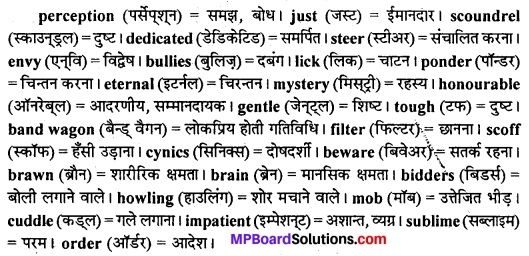
Above provided complete MP Board Solutions 11th English Study guide is useful for making your preparation effective. Students can frequently visit our page to get the latest updates on other subjects study materials.

